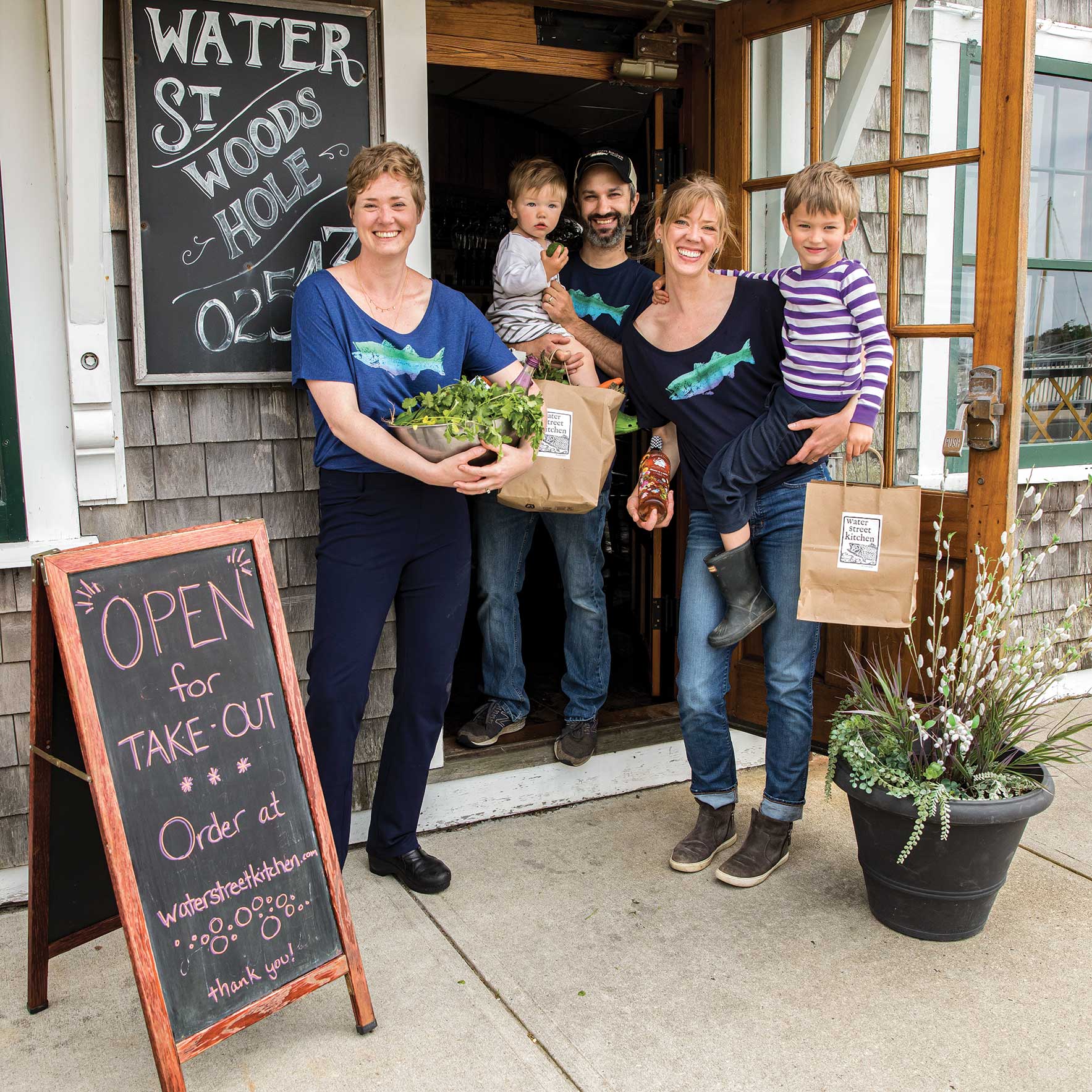by Lannan M. O’Brien
Photographs by Julia Cumes
Restaurant owners on the Cape and islands are a hardy breed.
They suffer lost business every winter, whether they close for the season or stay open to serve the year-rounders who remain. When the spring comes, they prepare and wait for the tide to change. The floodgates open, and from the bridges and ferries, business arrives like a storm surge. Every summer season, the kitchen seems to get hotter, the staff smaller, the crowds larger, and the challenges more insurmountable. Yet they continue to scramble on tired feet, making do with less—less staff, time, and inventory—to prepare their crews and brace their ships for the next rogue wave that comes their way.
This year, the wave arrived in a form no one had ever seen before: Covid-19. Still, they were prepared to meet it. Through the international pandemic, amid their own dining room closures, restaurants have managed to transform their operations—not only to keep their businesses afloat, but to provide life rafts for their communities and those on the front lines of this crisis. Here are some of their stories.
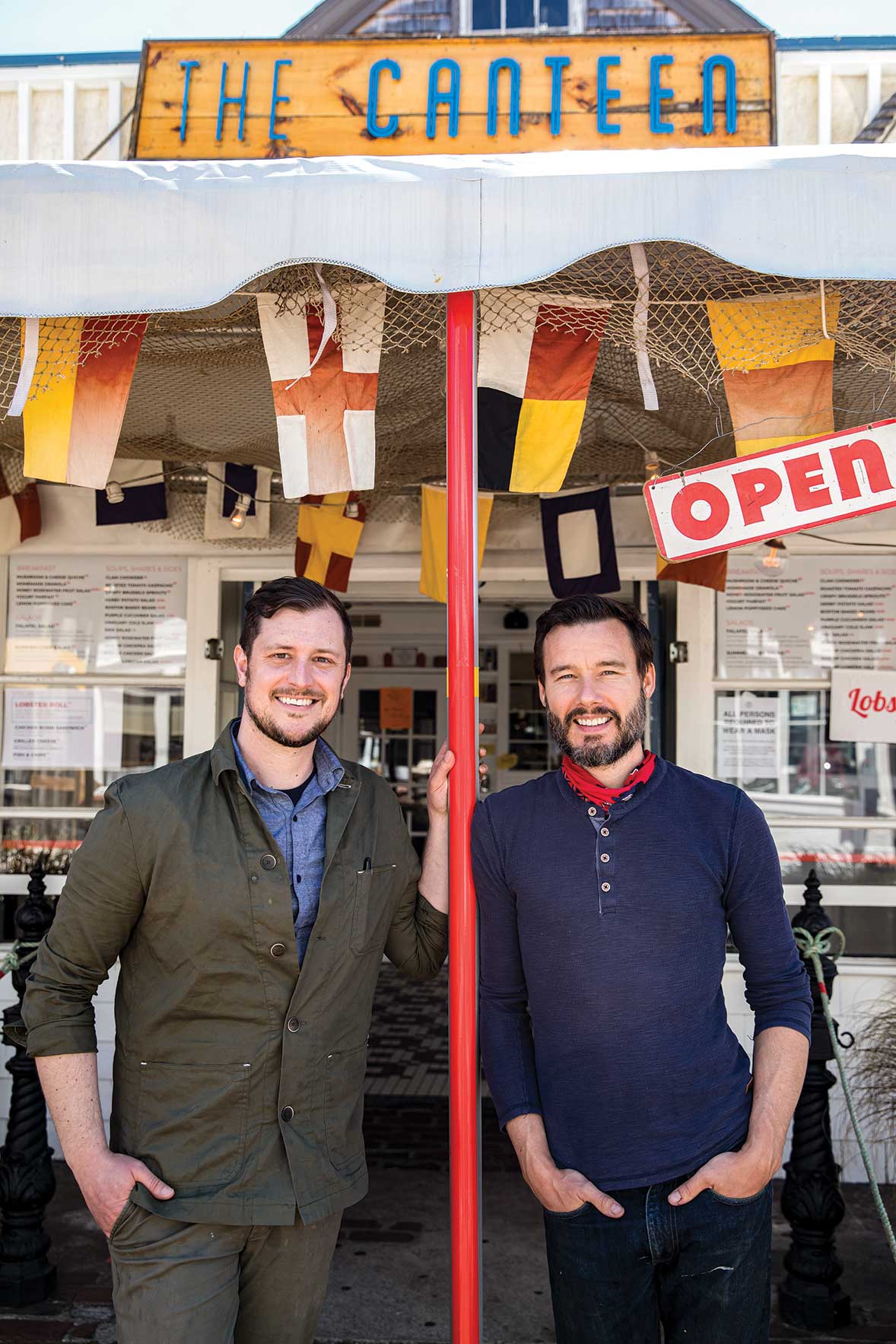
The Canteen
Provincetown
When the governor first announced restrictions on dine-in services, Loic Rossignon busted through a front window at his restaurant, The Canteen in Provincetown, and, lo and behold—after a minor renovation—takeout service began. “We have kind of a bohemian vibe and a ‘make it work’ mentality,” says restaurant co-owner Rob Anderson.
Immediately, they did just that for their employees, paying even those who couldn’t work due to their limited service. They gave their people whatever they needed, including food from their distributors, setting up a shelf of extra food for them to take home. And then, Anderson thought, “Well, I’m already doing this for my employees, maybe I could open this up to the rest of Provincetown,” he explains.
In addition to their regular takeout and delivery service, for which they’ve been offering cooked meals, grab-and-go options, and prepared meals to heat up at home, they started offering groceries, to go. Customers can purchase groceries for themselves or donate to the cause to help others. For these orders, The Canteen discounts the price of groceries, and delivers items to the person or family in need.
“We’re happy to be the conduit for that kind of generosity,” says Anderson, adding that doing creative things for their community is reflective of The Canteen’s mission. “For us, we’re just being who we are and adapting it to new circumstances.”
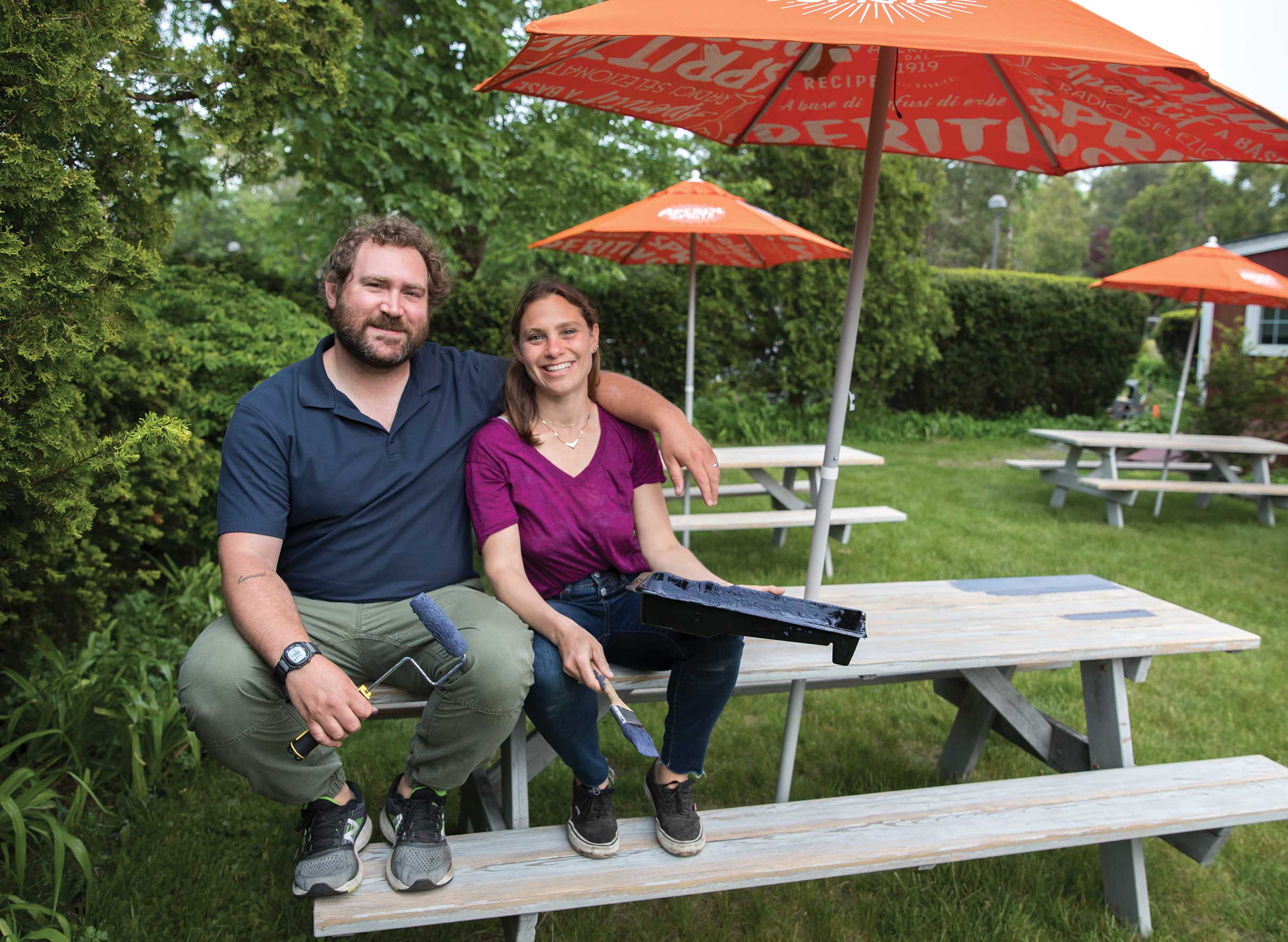
The Pheasant
Dennis
Adam and Erica Dunn were about to reopen their intimate, high-end restaurant, The Pheasant in Dennis, after a scheduled closure when the new regulations were announced. After closing for a bit longer, they decided to offer limited takeout on Fridays and Saturdays. “Everything was meant to be heated at home,” says Adam. “We decided to do meals for two, and offer beer and wine with it.”
The new system has been worth the effort, even as the two juggle work and parenting, packing orders while keeping an eye on their toddler in the pack-and-play at the restaurant. But looking ahead, the owners knew they’d need to prepare for a future of sit-down dining with social distancing, which wouldn’t be possible in their intimate setting indoors. “We thought about moving our restaurant outside, and said, ‘Let’s get some picnic tables,’” Adam says, explaining their vision of a welcoming beer garden-inspired atmosphere.
They spread the word on social media about picnic-table sponsorships, including a personalized plaque and the buyer’s preference of paint color. In two hours, sponsorships sold out, and many were disappointed that they had missed out. Invigorated, they offered new sponsorships for personalized planter beds to decorate the space—and those sold out in one hour. “We’re really fortunate to have this very strong network,” says Adam. Although some days are more challenging than others, Erica says, the recent experience has taught them to be flexible and open-minded about their business. And, she says, “It’s going to require customers to be flexible, too.”
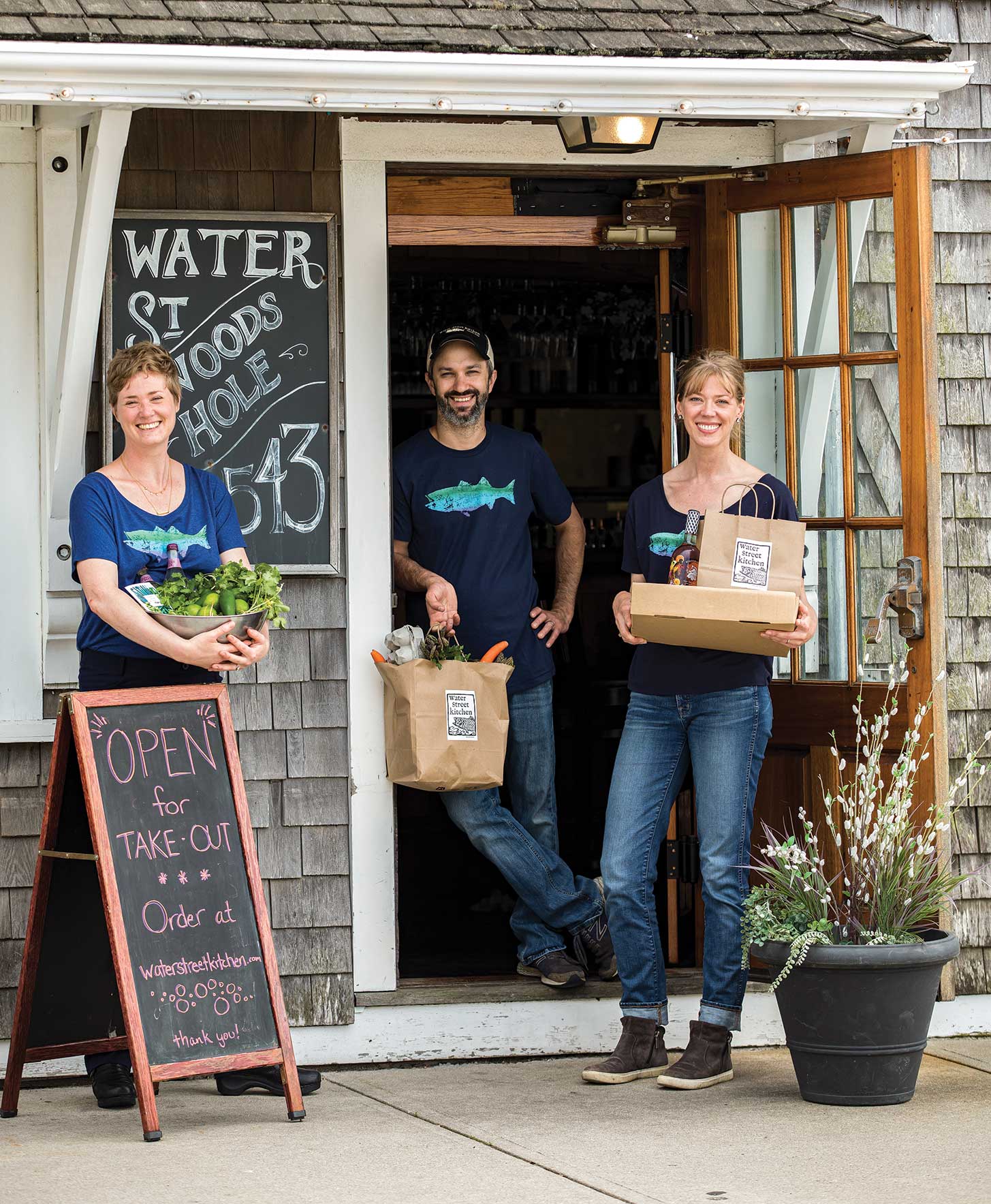
Water Street Kitchen
Woods Hole
The pandemic hit, and within a few days, the restaurant that Molly and John Wilson knew had vanished. Water Street Kitchen in Woods Hole is a fine-dining restaurant known for exceptional food and ocean views, but in March, the husband-and-wife team knew they needed to do something completely different. Due to safety concerns, they had to lay off employees, and with a staff of three—themselves and Molly’s sister, Chelsea Doohan, who usually manages the bar—they crafted a plan for family-style meals with a set menu, each order made to serve two people.
“We thought, how are the three of us going to cook this food?” Molly Wilson reflects. “My sister and I don’t normally work in the kitchen.” So, they learned how to prep and cook. Orders poured in with a demand much higher than expected. The phone kept ringing and they had to stop answering. Weeks passed, and the demand persisted. As of mid-May, they began making the transition to bring some of their staff back, spending hours on Zoom to train them in new systems of operation.
“I think it’s going to change our business model in ways that are good in the long run,” says Wilson. Now they’re more prepared for moments when the restaurant is short-staffed. Plus, she adds, “Because of the level of food we do, we never focused on takeout [before the pandemic].”
Now Water Street offers something new: high-end, internationally inspired cuisine made with fresh, seasonal ingredients that is available to go. One week might be an American classic like Southern-fried chicken, and the next, yellowfin tuna niçoise or Korean-fried haddock with kimchi-fried rice. But while the menu varies, business remains steady. “It’s a crazy time, and I think a lot of people are getting a lot of comfort from going out and getting takeout from their favorite restaurant,” Wilson says.
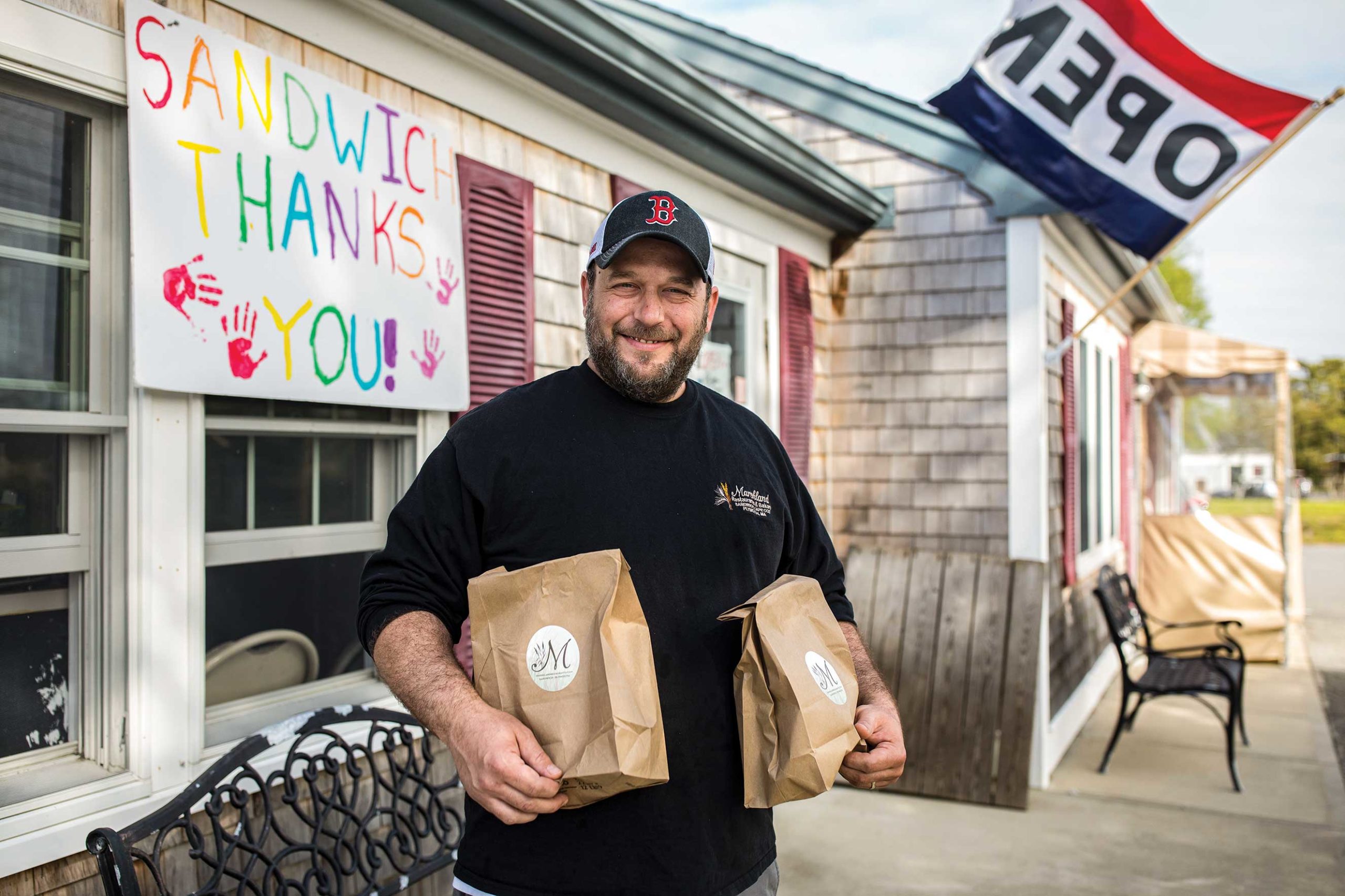
Marshland Restaurants
Sandwich
When schools closed in March, there was one thought weighing on Brandon Babiarz’s mind: a child who normally takes advantage of free lunch programs arriving home to a food-insecure house. As the director of operations for Marshland Restaurants—owned by his mother, Kim Babiarz, and Martin Finch—Babiarz coordinates efforts to provide food for Sandwich students in need during school vacation weeks through a partnership Marshland has shared with the school district for many years.
While the district was awaiting state approval to provide aid for students, Marshland took action, offering meals that the public could donate to any families they knew were in need—breakfast for $2.50 and lunch for $3—and posting about it on Facebook. In the matter of a few hours, the post was shared 1,000 times. “By the time I placed the order for food [the next day], we had received two or three thousand dollars in donations,” says Babiarz. It was enough for the restaurant group, with two locations in Sandwich and one in Plymouth, to provide 1,000 meals to families until schools were able to begin their own food program. Marshland continued to receive donations, using them to donate to a food drive for local families run by Sandwich High School.
All this in addition to regular takeout service, which Babiarz says has been successful. On the shift in operations, he says, “The restaurant industry has always been kind of forced to operate under pressure and in chaos mode. I think that’s why restaurants were best suited for something like this happening.”
Marshland Too & Too’s Tavern 315 Cotuit Road, Sandwich
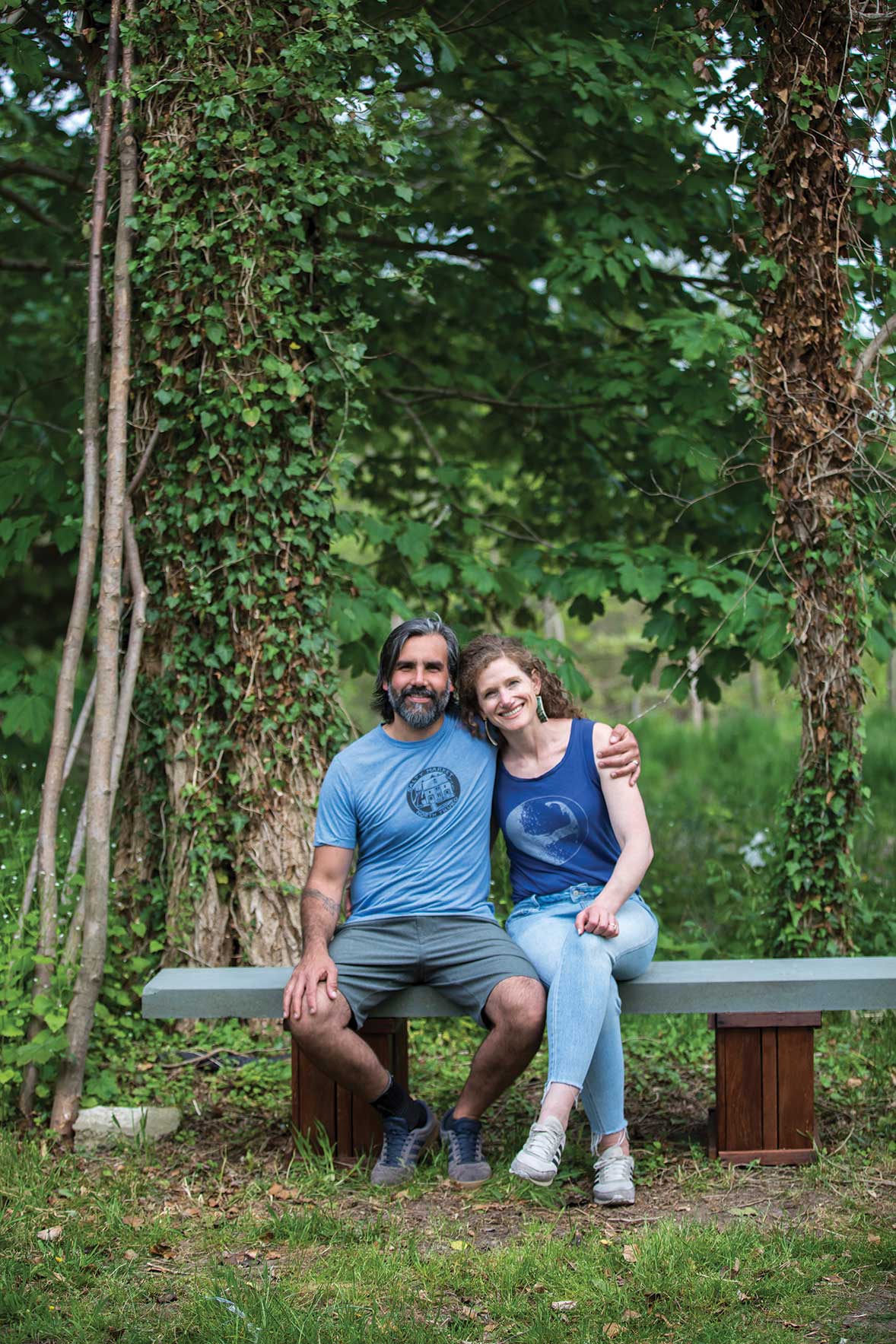
Snowy Owl Coffee Roasters
Brewster & Chatham
For the past few months, Snowy Owl Coffee Roasters has been on a mission to bring coffee to essential workers supporting Cape communities amid the Covid-19 pandemic. Manuel Ainzuain, who co-owns Snowy Owl with his wife, Shayna Ferullo, says that their friends who own a coffee business in San Francisco started a coffee donation program for healthcare workers during the pandemic. Inspired, they decided to adapt the program to the needs on Cape Cod.
They offered three types of coffee care packages: Just Coffee, which includes brewed coffee for 20 people; Coffee and Snack Bars, including brewed coffee and an assortment of snack bars from other local businesses; and Coffee and Chequessett Chocolate, a package of brewed coffee and Truro-made chocolate bars by Chequessett Chocolate. Buyers choose from a list of recipients, including area hospitals, fire and police departments, postal services, grocery stores and senior residences. “The good thing about this program has been seeing the response of the community,” Ainzuain says. As of early May, 126 packages had been purchased, and were delivered personally by the business owners to each location.
While their physical locations in Brewster and Chatham were initially closed, the donation program and regular online orders kept the husband-and-wife team busy, allowing them to bring some of their staff back to work. They reopened both locations for grab-and-go service in May, and added new outdoor tables at the Brewster location, allowing guests to enjoy their coffees amid the beautiful gardens, which are maintained by property owner Stephan Brown of Great Cape Herbs. This summer both locations are open for business, and the care packages will continue to be available as well.
Snowy Owl Espresso Bar 483 Main St., Chatham
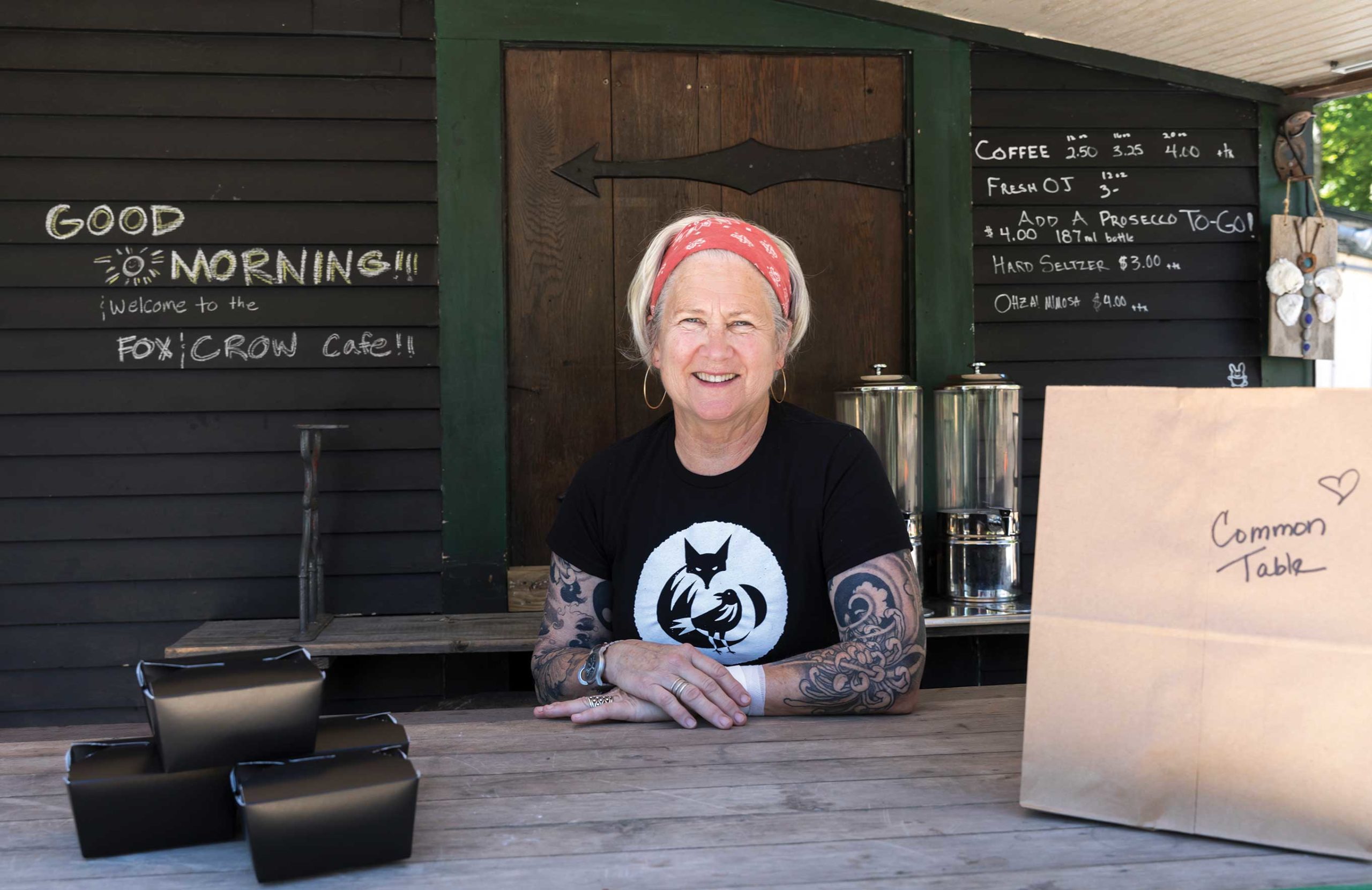
The Fox and Crow Café
Wellfleet
When the pandemic hit the Cape, Trudy Vermehren, owner of The Fox and Crow Café in Wellfleet, received a proposal from her friend and lawyer, Bruce Bierhans, to feed local kids in need through takeout meals from the restaurant. They started a GoFundMe page to raise money for the effort, and to their amazement, raised over $11,000 by the end of the day.
In order to make it happen, they started a nonprofit called The Common Table, and Vermehren says, people immediately stepped up to the plate to volunteer. People came to her volunteering to cook and deliver the food to families in need. A couple that was on sabbatical in the area at the time offered to help coordinate volunteers. Working together, they expanded the effort beyond children to include entire families, elderly couples, homeless individuals, and anyone in need of help. “Sometimes, they’re not that food insecure, but they need something to give them a bright spot,” says Vermehren.
In the midst of their food program, she began regular takeout service at Fox & Crow. Somehow, with the help of her staff, volunteers, and friends, she has made it all work. “I don’t get much of a break, but it’s kind of the nature of the beast,” Vermehren says matter-of-factly, adding with a laugh, “Now, everyone is so in sync, they tell me to go sit down and they’ll handle everything.”
As of mid-May, 5,500 meals were donated to people in need through The Common Table. Regardless of what happens, Vermehren and Bierhans plan to continue the nonprofit, changing its direction if necessary to meet the needs in the community.

